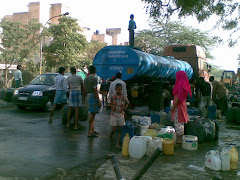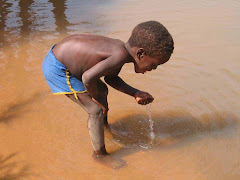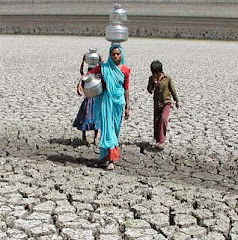After years of struggle to solve its water woes on its own, Delhi seems to be gearing up to embrace the private sector.
The Delhi government has indicated that it is considering joint ventures with various private companies for treatment and distribution of water. The government had a few years ago handed over distribution of power in private hands, an exercise that has met with reasonable success.
Recently, Delhi Chief Minister Sheila Dikshit also hinted at overhauling the water distribution system on the lines of electricity distribution that the city government carried out in 2002.
The city's water utility Delhi Jal Board is looking at allocating treatment and distribution to at least four or five separate units that will take care of command areas under Wazirabad, Chandrawal, Sonia Vihar, Nangloi, Haiderpur and Bhagirathi treatment plants.
DJB, which also looks after water distribution, has been hauled up in recent months over complaints ranging from water contamination to erratic supply. The civic agency had last year outsourced the jobs of water billing and installation of water meters to private entities in an efforts to make the services more efficient.
Delhi is slowly moving towards roping in the private sector in almost all aspects of water supply. Earlier this year, DJB given a long-term contract to SPML, one of India's leading companies in the water sector, for distribution of water to some areas in the city through private water tankers.
For years now, the city has been reeling under water shortage. DJB is only able to supply 800 million gallon per day (MGD) water as against the average demand of potable water of around 1,100 MGD.
Though Dikshit said reforms on the city’s water distribution system can only be brought after a consensus is reached on the issue, there has been apprehension in certain quarters regarding privatization of water. After water billing was handed over to private players, there had been several complaints about inflated water bills.
The naysayers seem to be holding on to that one example. They should realise that roping in the private sector to bring in efficienies and management expertise in certain areas does not mean privatisation.
For now, the CM has allayed fears that water management would not be privatized. Instead the government would enter into JVs with private companies or form smaller units under the government.
It is a matter of time before it becomes clear if the well-meaning Dikshit has taken yet another positive step!
Showing posts with label water treatment. Show all posts
Showing posts with label water treatment. Show all posts
Friday, March 25, 2011
Friday, February 26, 2010
India’s Voltas seeks to acquire water treatment companies
India's leading engineering services company Voltas Ltd has charted plans to expand operations in the global water treatment business. The company is also scouting for companies for acquisition overseas as well as in India.
The company, belonging to India's second largest business group, Tatas, is eyeing small-sized companies that will allow it to get entrenched in the local industry without having to set up fresh capacities and operations. The aquired companies are expected to provide Voltas pre-qualification in the water segment in their countries.
The company is also keen to acquire small companies in the hydro-carbon industry.
Voltas officials said the company was looking to make a few small-scale acquisitions in the range of Rs 100-200 crore in the water and hydrocarbon segment.
The company has been making efforts to expand its presence in the water industry, particularly in the water treatment segment, ever since it had undertaken a Rs 300 crore sewage treatment project in Singapore in 2007. It was keen to acquire companies in Singapore and Europe but had not been able to make any progress so far.
Voltas is eyeing overseas acquisitions in the water treatment segment whereas it prefers domestic acquisitions in the hydrocarbon space.
The company offers engineering solutions and undertakes electro-mechanical projects, which also include water management and treatment. Also, with water shortages becoming a big problem in several countries including India, China and the Middle East, the company has decided to step up its focus on the water treatment industry.
Over the years, Voltas has broaden its capabilities in the entire spectrum of water and wastewater management, including treatment of water for potability as well as industrial usage. The company also makes water, wastewater and sewage treatment equipment.
The company is also expecting a slew of new orders in the coming months from West Asia, Singapore and Hong Kong, among other countries.
The company, belonging to India's second largest business group, Tatas, is eyeing small-sized companies that will allow it to get entrenched in the local industry without having to set up fresh capacities and operations. The aquired companies are expected to provide Voltas pre-qualification in the water segment in their countries.
The company is also keen to acquire small companies in the hydro-carbon industry.
Voltas officials said the company was looking to make a few small-scale acquisitions in the range of Rs 100-200 crore in the water and hydrocarbon segment.
The company has been making efforts to expand its presence in the water industry, particularly in the water treatment segment, ever since it had undertaken a Rs 300 crore sewage treatment project in Singapore in 2007. It was keen to acquire companies in Singapore and Europe but had not been able to make any progress so far.
Voltas is eyeing overseas acquisitions in the water treatment segment whereas it prefers domestic acquisitions in the hydrocarbon space.
The company offers engineering solutions and undertakes electro-mechanical projects, which also include water management and treatment. Also, with water shortages becoming a big problem in several countries including India, China and the Middle East, the company has decided to step up its focus on the water treatment industry.
Over the years, Voltas has broaden its capabilities in the entire spectrum of water and wastewater management, including treatment of water for potability as well as industrial usage. The company also makes water, wastewater and sewage treatment equipment.
The company is also expecting a slew of new orders in the coming months from West Asia, Singapore and Hong Kong, among other countries.
Labels:
acquisition,
Voltas,
water shortage,
water treatment
Saturday, October 10, 2009
Look beyond innovations to tackle water shortages
Global water issues are becoming complex and experts now feel that tackling them would require some out-of-box thinking. Innovations are not enough where water scarcity is concerned and an effective solution to the water problem will involve a business model, creative packaging and a reasonable price, former technology officer of General Electric Water and Process Technologies Ramesh Rengarajan said.
Rengarajan said the requirement was to find solutions that married water sustainability with efficiency. He proposed treatment and reuse of water through a decentralized power system as one solution for water scarcity that may minimize environmental impacts. His comments came during an interactive session at the Massachusetts Institute of Technology in late August.
The former GE official said he saw the treatment and reuse of water as a solution for the growing water shortages across regions. While this "toilet-to-tap" method makes some people uneasy, it has been widely used with no harmful effects.
He said he envisioned a device people could plug in and use on-site, like an air conditioner, to disinfect water. The solution would have to be cost-effective in order to work. While people are willing to pay for gas and oil, they are reluctant to do so for water, he added.
According to Rengarajan, finding a solution to global water scarcity was 'not a challenge, but an opportunity'. A solution would benefit the environment and potentially create a multibillion-dollar business, he added.
Against a backdrop of growing water scarcity around the world, any business that promises a solution would indeed be worthwhile. The last several years have seen advancement in technology solutions including new and efficient ways to desaline, reuse and treat water. Now, water is even being made from mist, or out of air. Going ahead, all of these would become still more efficient and effective, and hopefully, some new solutions would arrive.
Rengarajan said the requirement was to find solutions that married water sustainability with efficiency. He proposed treatment and reuse of water through a decentralized power system as one solution for water scarcity that may minimize environmental impacts. His comments came during an interactive session at the Massachusetts Institute of Technology in late August.
The former GE official said he saw the treatment and reuse of water as a solution for the growing water shortages across regions. While this "toilet-to-tap" method makes some people uneasy, it has been widely used with no harmful effects.
He said he envisioned a device people could plug in and use on-site, like an air conditioner, to disinfect water. The solution would have to be cost-effective in order to work. While people are willing to pay for gas and oil, they are reluctant to do so for water, he added.
According to Rengarajan, finding a solution to global water scarcity was 'not a challenge, but an opportunity'. A solution would benefit the environment and potentially create a multibillion-dollar business, he added.
Against a backdrop of growing water scarcity around the world, any business that promises a solution would indeed be worthwhile. The last several years have seen advancement in technology solutions including new and efficient ways to desaline, reuse and treat water. Now, water is even being made from mist, or out of air. Going ahead, all of these would become still more efficient and effective, and hopefully, some new solutions would arrive.
Labels:
water reuse,
water scarcity,
water treatment
Subscribe to:
Posts (Atom)

.jpg)


